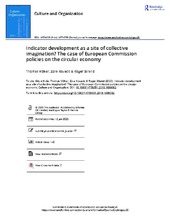Indicator development as a site of collective imagination? The case of European Commission policies on the circular economy
Journal article, Peer reviewed
Published version

Åpne
Permanent lenke
https://hdl.handle.net/1956/23327Utgivelsesdato
2020Metadata
Vis full innførselSamlinger
Originalversjon
https://doi.org/10.1080/14759551.2019.1699092Sammendrag
In recent years the concept of the circular economy gained prominence in EU policy-making. The circular economy promotes a future in which linear ‘make-use-dispose’ cultures are replaced by more circular models. In this paper, we use the concept of sociotechnical imaginaries to ask how an imaginary of circularity has been assembled and stabilized, which imaginative resources were drawn on, and how goals, priorities, benefits and risks haven been merged with discourses of innovation, sustainability and growth. Drawing on policy documents and interviews with policy officers of the European Commission, we argue that the monitoring framework and indicator development function as a site collective imagination in which desirable ‘circular’ futures are co-produced. These futures are imagined to provide novel opportunities for the private sector and to generate jobs and economic growth while at the same time improving the natural environment as measured by selected environmental indicators.
